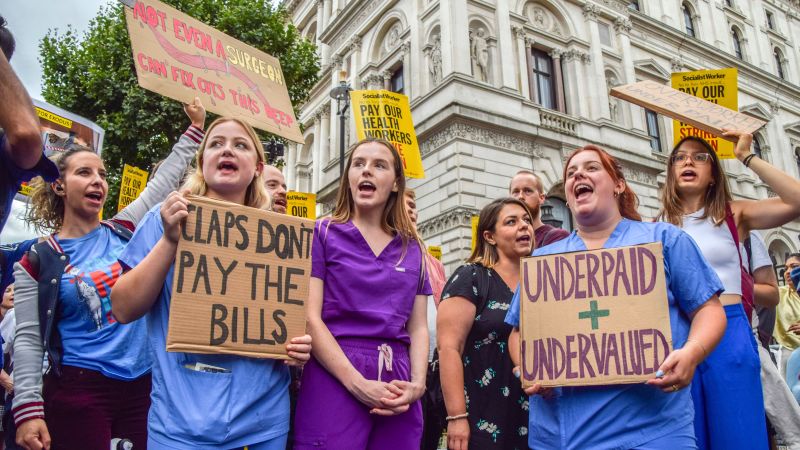
London
CNN
—
The British government is looking into bringing in the military to mitigate industrial action and keep public services running, the chairman of the governing Conservative Party said Sunday, after a wave of strikes that were sparked by a cost-of-living crisis and an economy sliding into recession.
The action includes border control and state-run healthcare services, if key workers including nurses and ambulance drivers go on strike.
“Our message to the unions is to say, this is not a time to strike, this is time to try and negotiate. But in the absence of that, it’s important for the government, it’s the right and responsible thing to do to have contingency plans in place,” Conservative Party chairman Nadhim Zahawi told Sky News.
“We’re looking at the military, we’re looking at a specialist response force […] to be able to deal with in the unfortunate circumstance if you do have a strike of border force,” Zahawi added.
“Of course, in things like driving ambulances, other parts of the public sector, we’ve got to try and minimize disruption,” said Zahawi, in response to a question about strikes affecting the UK’s National Health Service.
Strikes have swept the UK this year, as workers grapple with a worsening cost-of-living crisis and an economy that is sliding into a recession. CNN Business previously reported that wages have stagnated and failed to keep pace with inflation, now at a 41-year high, setting the stage for clashes between employers and employees.
Those clashes have already caused widespread disruption, including to train travel, and are now spreading to even more sectors, such as education, healthcare and security.
More than 70,000 university workers went on strike over pay, working conditions and pensions on Thursday, November 24, and Friday, November 25 at 150 universities across the United Kingdom.
The strike was the biggest in the history of British higher education, affecting over 2.5 million students, according to the University and College Union, which organized the strike.
According to the Office for National Statistics, 356,000 days were lost to strike action in August, not far off the previous high recorded in July 2014, when 386,000 days were lost. That number dipped to 205,000 in September.
The disruption has continued into the winter months, with RMT, Britain’s largest transport union, announcing in November four 48-hour strikes in December and January.
The Communication Workers Union (CWU), which represents striking postal workers, announced additional walkouts on December 9, 11, 14, 15, 23 and 24, which could jeopardize Christmas deliveries.
Note:- (Not all news on the site expresses the point of view of the site, but we transmit this news automatically and translate it through programmatic technology on the site and not from a human editor. The content is auto-generated from a syndicated feed.))




What i don’t understood is actually how you are not actually a lot more neatly-favored than you may be right now.
You’re so intelligent. You know therefore considerably in terms of this topic, made
me in my opinion believe it from numerous numerous angles.
Its like men and women don’t seem to be interested except it is one thing to do with
Woman gaga! Your personal stuffs outstanding. Always care for it up!
Heya! I just wanted to ask if you ever have any problems with hackers?
My last blog (wordpress) was hacked and I ended up losing many months of hard
work due to no data backup. Do you have any methods to
prevent hackers?
penis enlargement
Hi there just wanted to give you a quick heads up.
The words in your post seem to be running off the screen in Chrome.
I’m not sure if this is a formatting issue or something to do with internet browser compatibility but I figured I’d post to let you know.
The style and design look great though! Hope you get the problem fixed soon. Cheers
Good post. I am dealing with a few of these issues as well.. https://Cl-System.jp/question/magasins-de-comptoir-de-cuisine-a-montreal-trouvez-le-comptoir-ideal-pour-votre-cuisine-5/
We stumbled over here by a different web address and thought I may as well check things out.
I like what I see so i am just following you.
Look forward to exploring your web page repeatedly.